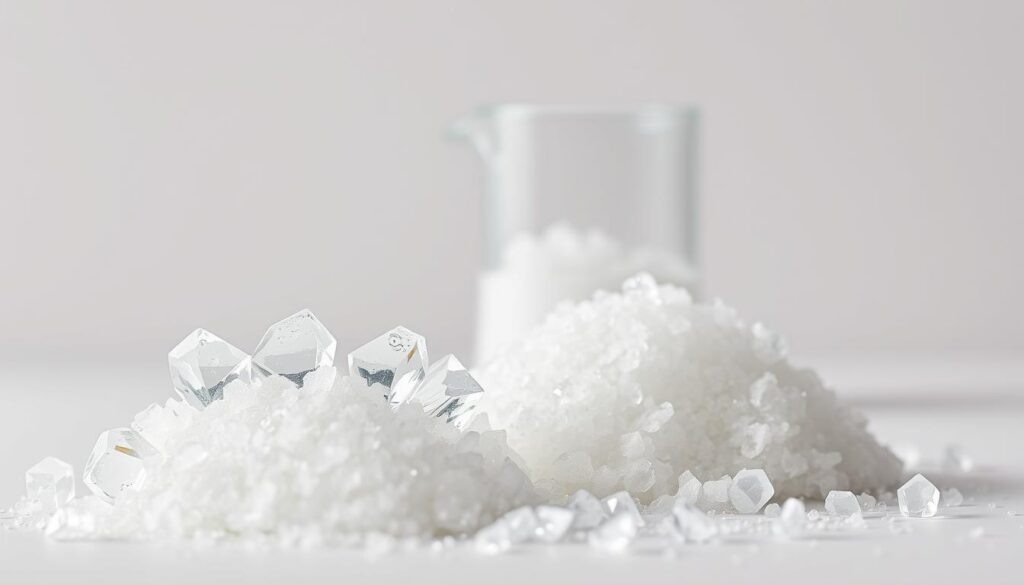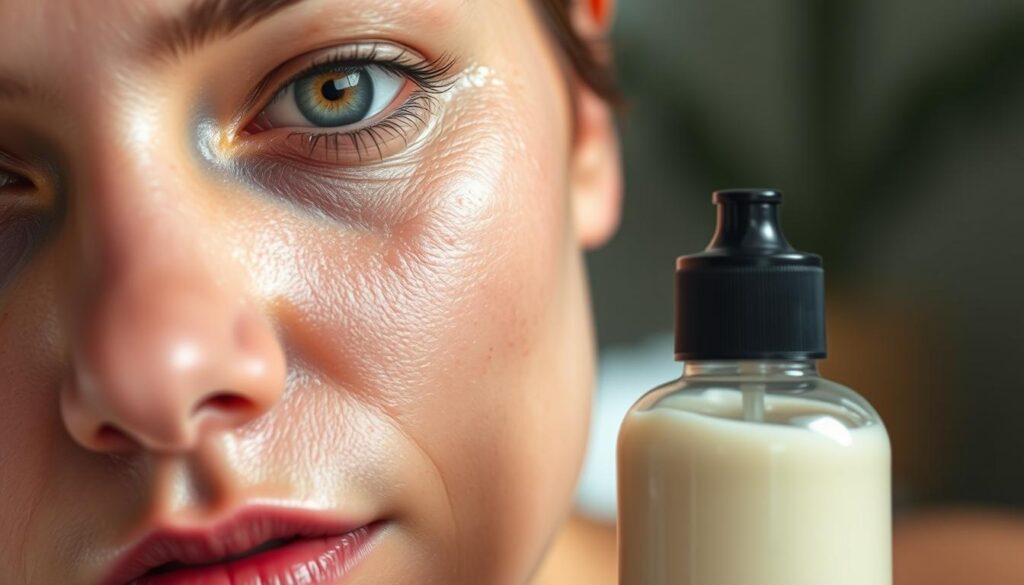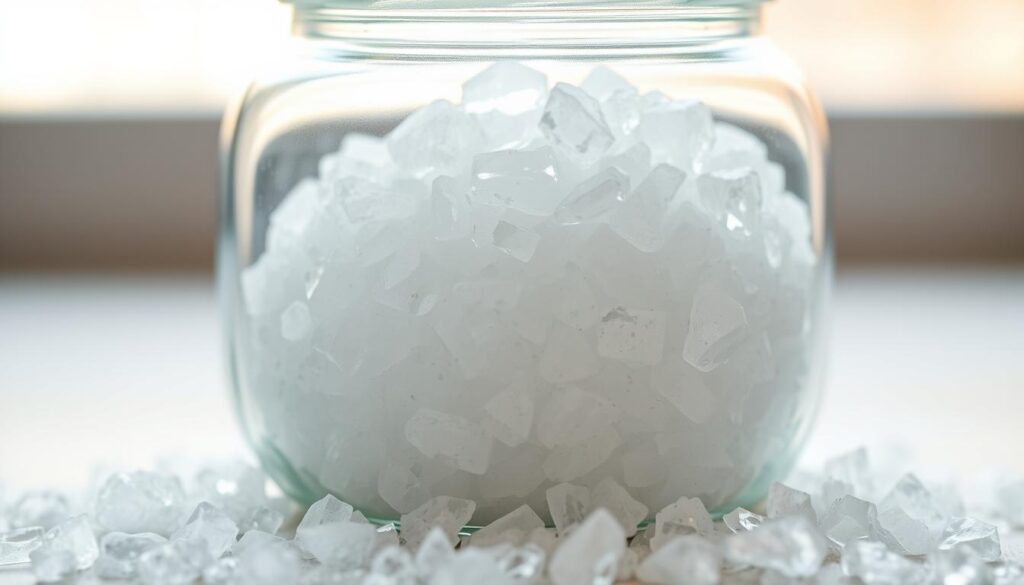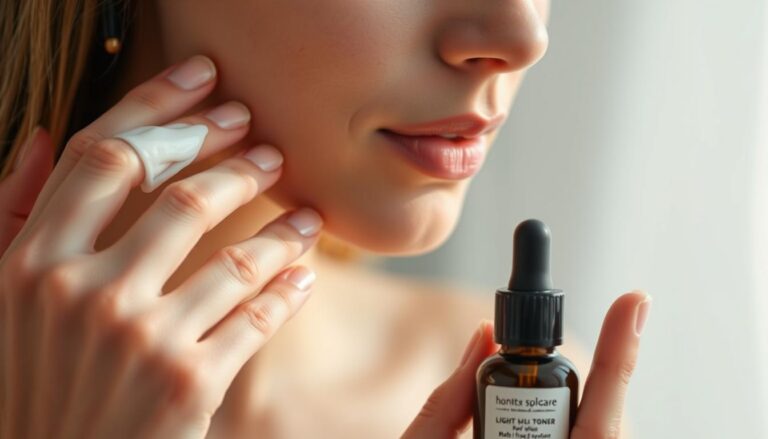At Glowskinhub.com, we believe beauty isn’t just a look—it’s a feeling

Benefits of Epsom salt baths for skin
Soaking in a warm Epsom salt bath can be a simple yet effective way to enhance your skincare routine, particularly for those with oily Skin. The natural properties of Epsom salt help to reduce inflammation and improve overall Skin health.
By incorporating Epsom salt baths into your routine, you can achieve a clearer complexion and reduce the appearance of pores, a key aspect of the best skincare routine for oily Skin. Regular use can lead to healthier, more balanced Skin.
Key Takeaways
- Reduces inflammation and improves Skin health
- Enhances skincare routine for oily Skin
- Helps achieve a clearer complexion
- Reduces the appearance of pores
- Leads to healthier, more balanced Skin
What is Epsom Salt and How Does It Work?
Epsom salt, rich in magnesium, is a popular additive for baths intended to relax and rejuvenate the Skin. It has been a staple in traditional skincare routines, particularly for its potential to address various Skin concerns, including those related to oily Skin.
The Chemical Composition of Epsom Salt
Epsom salt is primarily composed of magnesium sulfate (magnesium sulfate), a naturally occurring mineral compound. “Magnesium sulfate is known for its ability to be absorbed through the Skin, providing essential minerals that can help in maintaining healthy Skin”
as stated in various skincare research
. The magnesium in Epsom salt plays a crucial role in many bodily functions, including Skin health.

How Epsom Salt Interacts with Skin
When added to bath water, Epsom salt dissolves and releases magnesium and sulfate ions. These ions can then be absorbed through the Skin, potentially benefiting Skin health. For individuals with oily Skin, incorporating Epsom salt into their oily Skin routine may help in regulating sebum production and reducing inflammation.
As part of a comprehensive skincare for oily Skin regimen, Epsom salt baths can be particularly beneficial. The magnesium absorbed through the Skin can help in reducing inflammation and potentially alleviating conditions like acne, which is often associated with oily Skin.
Benefits of Epsom Salt Baths for Skin
Epsom salt baths are not just a relaxing experience; they also offer several benefits for the Skin. One of the primary advantages is the absorption of magnesium, a mineral that plays a crucial role in Skin health.
Magnesium Absorption Through the Skin
Magnesium is an essential mineral that is often deficient in many individuals. When added to bath water, Epsom salt (magnesium sulfate) can be absorbed through the Skin, helping to replenish magnesium levels in the body. This absorption can lead to improved Skin health, as magnesium helps to regulate various bodily functions, including inflammation and hydration.
The Skin’s ability to absorb magnesium is supported by research, indicating that transdermal magnesium absorption is a viable method for increasing magnesium levels. This is particularly beneficial for individuals who have difficulty absorbing magnesium through the digestive system.

Scientific Evidence and Research
Numerous studies have investigated the benefits of Epsom salt baths for Skin health. Research has shown that magnesium, absorbed through the Skin, can help reduce inflammation and improve conditions such as eczema and psoriasis. For individuals with oily Skin, incorporating Epsom salt baths into their skincare routine may provide additional benefits, such as reduced sebum production and improved Skin clarity.
When considering oily Skin care tips, it’s essential to look at products and treatments that help regulate sebum production without stripping the Skin of its natural oils. Epsom salt baths can be a valuable addition to an oily Skin care regimen, offering a natural and non-invasive method for improving Skin health.
For those looking for oily Skin products to complement their Epsom salt baths, there are various options available, including products containing magnesium and other Skin-benefiting minerals.
Exfoliation and Dead Skin Cell Removal
Epsom salt acts as a gentle exfoliant, helping to remove dead Skin cells without causing irritation. This natural exfoliation process can be a valuable addition to your skincare routine, especially when combined with other skincare practices.
How Epsom Salt Acts as a Natural Exfoliant
The magnesium in Epsom salt plays a crucial role in its exfoliating properties. Magnesium helps to reduce inflammation and improve Skin health, making it an ideal ingredient for those with sensitive Skin.
When used in a bath, Epsom salt can help to gently remove dead Skin cells, revealing smoother and healthier-looking Skin. This process is not only beneficial for Skin appearance but also for its overall health.
Techniques for Optimal Exfoliation
To maximize the exfoliating benefits of Epsom salt, certain techniques can be employed. Here are some tips for optimal exfoliation:
- Mix Epsom salt with a carrier oil like coconut or olive oil to create a gentle scrub.
- Gently massage the Epsom salt scrub onto the Skin in circular motions.
- Rinse thoroughly with warm water, then pat dry.
- For best results, exfoliate 1-2 times a week, depending on your Skin type.
For individuals with oily Skin, incorporating Epsom salt into their oily Skin regimen can help regulate sebum production and reduce the appearance of pores.
Using Epsom salt as part of a broader skincare routine can enhance its benefits. Consider combining Epsom salt baths with other best products for oily Skin to achieve a balanced and effective skincare regimen.

Reducing Inflammation and Skin Irritation
The anti-inflammatory properties of Epsom salt make it an ideal ingredient for soothing Skin irritations. Epsom salt, rich in magnesium, plays a crucial role in reducing inflammation and promoting Skin health.
Anti-inflammatory Properties
Epsom salt’s anti-inflammatory properties are primarily attributed to its magnesium content. Magnesium has been shown to help reduce inflammation by inhibiting the production of pro-inflammatory cytokines. When absorbed through the Skin during an Epsom salt bath, magnesium can help calm irritated Skin and reduce redness.
Magnesium’s role in inflammation reduction is multifaceted, involving the regulation of various biochemical pathways that contribute to the inflammatory response. By modulating these pathways, magnesium helps to mitigate the severity of inflammatory reactions on the Skin.
Treating Skin Conditions Like Eczema and Psoriasis
Eczema and psoriasis are chronic Skin conditions characterized by inflammation and irritation. Epsom salt baths can provide relief by reducing the inflammation associated with these conditions. The magnesium in Epsom salt helps to repair the Skin’s barrier function, reducing the severity of symptoms.
For individuals suffering from eczema or psoriasis, incorporating Epsom salt baths into their skincare routine can be beneficial. It’s essential to consult with a healthcare professional before starting any new treatment regimen.

While Epsom salt is beneficial for various Skin types, individuals with oily Skin can also benefit from its anti-inflammatory properties. Using an oily Skin moisturizer after an Epsom salt bath can help maintain the Skin’s moisture balance without clogging pores.
Detoxification Benefits for Skin Health
Epsom salt, rich in magnesium, plays a significant role in drawing out impurities from the Skin, thus supporting its natural detoxification process. This natural detoxification is crucial for maintaining healthy, vibrant Skin.
Drawing Out Impurities
The process of drawing out impurities is fundamental to Skin health. Epsom salt baths facilitate this by reducing inflammation and cleansing the Skin of toxins. The magnesium in Epsom salt is absorbed through the Skin, helping to neutralize toxins and promote a clearer complexion.
A study published in the Journal of Clinical and Aesthetic Dermatology highlights the benefits of magnesium for Skin health, noting its role in improving Skin’s natural barrier function.
“Magnesium is crucial for Skin health, playing a significant role in the Skin’s natural barrier function and overall wellbeing.”
Supporting the Skin’s Natural Detox Process
Epsom salt baths support the Skin’s natural detox process by enhancing the elimination of toxins. Regular use can lead to improved Skin clarity and reduced appearance of pores.
| Benefit | Description |
|---|---|
| Toxin Elimination | Epsom salt enhances the Skin’s natural ability to eliminate toxins. |
| Skin Clarity | Regular Epsom salt baths can improve Skin clarity. |
| Pore Minimization | The detoxifying effect can reduce the appearance of pores. |
For individuals dealing with oily Skin, incorporating Epsom salt into their skincare routine can be particularly beneficial as part of an oily Skin treatment regimen. It helps in regulating sebum production and reducing the occurrence of clogged pores.

Improving Skin Hydration and Moisture Balance
One of the key benefits of incorporating Epsom salt into your skincare routine is improved moisture balance. Epsom salt baths have been shown to enhance the Skin’s natural barrier function, leading to better hydration and reduced dryness.
Epsom Salt’s Effect on Skin Barrier Function
The Skin’s barrier function is crucial for maintaining optimal hydration levels. Epsom salt, rich in magnesium, plays a significant role in strengthening this barrier. Magnesium helps to regulate the Skin’s natural moisture levels, ensuring that it remains hydrated and supple.
Magnesium deficiency is common and can lead to dry, irritated Skin. By using Epsom salt baths, individuals can replenish magnesium levels, thereby supporting the Skin’s barrier function and improving overall hydration.
Combating Dryness and Flakiness
Dry, flaky Skin can be uncomfortable and unsightly. Epsom salt baths offer a natural solution to this common issue. By exfoliating and nourishing the Skin, Epsom salt helps to remove dead Skin cells, revealing smoother, more hydrated Skin.

The benefits of Epsom salt baths for Skin hydration can be summarized in the following table:
| Benefit | Description | Result |
|---|---|---|
| Enhanced Skin Barrier Function | Magnesium in Epsom salt strengthens the Skin’s natural barrier. | Better hydration and reduced dryness. |
| Exfoliation and Nourishment | Epsom salt helps remove dead Skin cells and nourish the Skin. | Smoother, more hydrated Skin. |
| Magnesium Replenishment | Epsom salt baths replenish magnesium levels in the Skin. | Improved Skin health and hydration. |
By incorporating Epsom salt baths into your skincare routine, you can achieve improved Skin hydration and moisture balance, leading to healthier, more radiant Skin.
Epsom Salt for Oily Skin Care
Epsom salt, rich in magnesium, offers a natural solution for managing oily Skin and related issues. Oily Skin can be a persistent problem, leading to clogged pores and breakouts. However, incorporating Epsom salt into your skincare routine can help mitigate these issues.
Regulating Sebum Production
One of the primary benefits of using Epsom salt for oily Skin is its ability to regulate sebum production. Magnesium, a key component of Epsom salt, helps to balance the Skin’s natural oil production, reducing the likelihood of overly oily Skin. This is achieved through magnesium’s effect on the Skin’s sebaceous glands, helping to normalize their function.
To illustrate the impact of Epsom salt on sebum production, consider the following comparison:
| Skin Type | Sebum Production Level | Effect of Epsom Salt |
|---|---|---|
| Oily Skin | High | Reduces sebum production |
| Normal Skin | Moderate | Maintains balance |
| Dry Skin | Low | May increase moisture |
Best Skincare Routine for Oily Skin with Epsom Salt
To maximize the benefits of Epsom salt for oily Skin, it’s essential to incorporate it into a comprehensive skincare routine. Start by using an Epsom salt scrub once or twice a week to exfoliate and remove dead Skin cells. Follow this with a gentle cleanser and a lightweight moisturizer to keep the Skin hydrated without clogging pores.
Tips for an effective oily Skin care routine with Epsom salt:
- Use Epsom salt scrubs or masks once or twice a week.
- Cleanse your face with a gentle, non-comedogenic cleanser.
- Apply a lightweight, oil-free moisturizer.
- Avoid over-washing, as this can strip the Skin of its natural oils, leading to increased sebum production.
Preventing Clogged Pores and Breakouts
Epsom salt can also help prevent clogged pores and breakouts by reducing inflammation and drawing out impurities from the Skin. Regular use of Epsom salt baths or treatments can lead to clearer, healthier-looking Skin.

By incorporating Epsom salt into your skincare routine, you can enjoy the benefits of regulated sebum production, reduced inflammation, and clearer Skin. For best results, combine Epsom salt treatments with a consistent skincare routine and healthy lifestyle choices.
How to Prepare the Perfect Epsom Salt Bath
Creating an Epsom salt bath that’s both relaxing and beneficial for your Skin involves a few simple steps. To maximize the benefits, particularly for oily Skin care, it’s essential to prepare the bath correctly.
Ideal Water Temperature and Salt Concentration
The ideal water temperature for an Epsom salt bath is between 98°F and 104°F (36°C to 40°C), which helps in relaxing the muscles and opening up the pores for better magnesium absorption. For the salt concentration, a general guideline is to use 1-2 cups of Epsom salt for an average-sized bathtub.
Recommended Soaking Time
The recommended soaking time in an Epsom salt bath is typically between 15 to 20 minutes. This duration allows for optimal magnesium absorption and relaxation without causing dehydration.
Enhancing Your Bath with Essential Oils
To further enhance your Epsom salt bath experience, consider adding a few drops of essential oils known for their Skin benefits, such as lavender for its calming properties or tea tree oil for its acne-fighting abilities. Here are some tips for incorporating essential oils into your bath:
- Choose high-quality, pure essential oils.
- Start with a small amount (5-7 drops) and adjust according to your preference.
- Blend different oils to create a unique scent or benefit.
For individuals with oily Skin, incorporating Epsom salt baths into their skincare routine can be particularly beneficial. It helps in regulating sebum production and reducing inflammation. Here are some additional oily Skin care tips to complement your Epsom salt baths:
- Maintain a consistent skincare routine that includes gentle cleansing and moisturizing.
- Use non-comedogenic products that won’t clog pores.
- Exfoliate regularly to remove dead Skin cells and prevent clogged pores.
By following these guidelines and tips, you can create an Epsom salt bath experience that not only relaxes your body but also benefits your Skin, particularly if you have oily Skin concerns.
DIY Epsom Salt Skin Treatments
DIY Epsom salt Skin treatments offer a natural and cost-effective way to enhance your skincare regimen. By incorporating Epsom salt into your routine, you can leverage its benefits for various Skin concerns.
Epsom Salt Scrubs and Masks
Epsom salt can be used to create effective scrubs and masks that help in exfoliating and nourishing the Skin. A simple Epsom salt scrub can be made by mixing it with a carrier oil like coconut or olive oil.
Recipe: Mix 2 tablespoons of Epsom salt with 1 tablespoon of coconut oil and a few drops of lavender essential oil. Use this scrub to gently exfoliate your Skin in the shower, then rinse with warm water.
For a relaxing mask, you can combine Epsom salt with honey and yogurt. Honey has antibacterial properties, while yogurt provides lactic acid for gentle exfoliation.
Mask Recipe: Mix 1 tablespoon of Epsom salt with 2 tablespoons of honey and 1 tablespoon of yogurt. Apply this mask to your face, leave it on for 10-15 minutes, and then rinse with lukewarm water.
Spot Treatments for Problem Areas
Epsom salt can be used as a spot treatment for acne and other Skin irritations. Its anti-inflammatory properties help reduce redness and swelling.
Spot Treatment Recipe: Mix a small amount of Epsom salt with water to form a paste. Apply this paste directly to the affected area using a cotton swab. Leave it on overnight and wash it off with cold water in the morning.
Oily Skin Treatment Recipes
For those with oily Skin, Epsom salt can help regulate sebum production and reduce the appearance of pores. Here are some recipes tailored for oily Skin.
| Treatment | Ingredients | Instructions |
|---|---|---|
| Epsom Salt Face Mask for Oily Skin | 1 tbsp Epsom salt, 2 tbsp apple cider vinegar, 1 tbsp aloe vera gel | Mix all ingredients, apply to face, leave on for 10 minutes, rinse with lukewarm water. |
| Epsom Salt Scrub for Oily Skin | 2 tbsp Epsom salt, 1 tbsp lemon juice, 1 tbsp olive oil | Mix all ingredients, gently scrub the Skin, rinse with warm water. |
By incorporating these DIY Epsom salt treatments into your skincare routine, you can enjoy the benefits of oily Skin products without harsh chemicals. These best products for oily Skin are not only effective but also natural and easy to prepare.
Comparing Epsom Salt to Other Bath Additives
In the realm of bath additives, Epsom salt is often touted for its skincare benefits, but how does it compare to other popular options like sea salt and bath oils? As consumers become more discerning about their skincare routines, understanding the unique advantages of each bath additive is crucial.
Epsom salt, rich in magnesium, offers a distinct set of benefits that differentiate it from other bath additives. For instance, its ability to reduce inflammation and improve Skin hydration makes it an attractive option for those with Skin conditions like eczema.
Epsom Salt vs. Sea Salt for Skin Benefits
While both Epsom salt and sea salt are popular bath additives, they have different compositions and benefits. Sea salt is primarily sodium chloride, with some varieties containing additional minerals. In contrast, Epsom salt is magnesium sulfate, providing a rich source of magnesium that is absorbed through the Skin.
“Magnesium is a critical component for Skin health, playing a key role in reducing inflammation and promoting hydration,” notes a skincare expert. This makes Epsom salt particularly beneficial for individuals with dry or irritated Skin.
Epsom Salt vs. Bath Oils and Bubble Baths
Bath oils and bubble baths are designed to moisturize and cleanse the Skin, respectively. However, they often lack the therapeutic benefits associated with Epsom salt. Bath oils can leave a residue on the Skin, potentially clogging pores, while bubble baths can strip the Skin of its natural oils, leading to dryness.
In contrast, Epsom salt baths are known for their detoxifying properties and ability to soothe Skin irritations without leaving residues. This makes Epsom salt a preferable choice for those seeking a therapeutic bath experience.
Best Products for Oily Skin Concerns
For individuals with oily Skin, incorporating Epsom salt into their skincare routine can be particularly beneficial. It helps regulate sebum production and reduce the appearance of pores. When selecting Epsom salt products, look for those that are pure and free from additives.
- Choose products with high magnesium content for maximum benefit.
- Consider combining Epsom salt with other natural ingredients like essential oils for enhanced skincare benefits.
- Be mindful of the concentration of Epsom salt in your bath to avoid over-drying the Skin.
By understanding the unique benefits of Epsom salt compared to other bath additives, individuals can make informed decisions about their skincare routines, potentially leading to healthier, more balanced Skin.
Top Epsom Salt Products in the UK Market
In the UK, consumers can find a wide array of Epsom salt products, from pure salts to specialized formulations designed to cater to various Skin types and concerns.
Pure Epsom Salt Brands
Pure Epsom salt is a popular choice among consumers who prefer a straightforward, uncomplicated product. Brands like Boots Epsom Salts and LifeS2 Epsom Salt offer high-quality, pure Epsom salt that can be used for bathing, skincare routines, or as a natural remedy for various ailments.
These products are often praised for their effectiveness and affordability. For instance, Boots Epsom Salts is known for its high magnesium content, which is beneficial for Skin health and relaxation.
| Brand | Purity | Price Range |
|---|---|---|
| Boots Epsom Salts | 99.9% | £5-£10 |
| LifeS2 Epsom Salt | 99.5% | £8-£15 |
Specialised Formulations for Different Skin Types
Some Epsom salt products are formulated to address specific Skin concerns, such as dryness, irritation, or oiliness. For example, Epsom Salt + Lavender by LifeS2 is designed to enhance relaxation and soothe the Skin.
“Epsom salt baths can be particularly beneficial for individuals with Skin conditions like eczema or psoriasis, as they help reduce inflammation and promote healing.” –
Oily Skin Moisturizers with Magnesium
For individuals with oily Skin, finding a moisturizer that does not clog pores can be challenging. Products that combine Epsom salt (magnesium sulfate) with other natural ingredients can help regulate sebum production and hydrate the Skin without exacerbating oiliness.
Budget-Friendly Options
Budget-friendly options like Simple Epsom Salt offer an affordable entry point for those new to using Epsom salt in their skincare routine. These products are often free from additives and fragrances, making them suitable for sensitive Skin.
Premium and Organic Choices
For those willing to invest in premium products, brands like Neal’s Yard Remedies offer organic Epsom salt products that are rich in magnesium and carefully formulated to enhance Skin health.
- Neal’s Yard Remedies Organic Epsom Salt
- Dr. Teal’s Epsom Salt
Conclusion: Making Epsom Salt a Regular Part of Your Skincare Regimen
Incorporating Epsom salt baths into your skincare routine can have a significant impact on your Skin’s health and appearance. By understanding the benefits of Epsom salt baths for Skin, you can harness its potential to improve your Skin’s hydration, reduce inflammation, and enhance its overall texture.
For individuals with oily Skin, a best skincare routine for oily Skin that includes Epsom salt can help regulate sebum production, reduce the appearance of pores, and prevent breakouts. Regular Epsom salt baths can also help to detoxify the Skin, promoting a clearer and more radiant complexion.
To make Epsom salt a part of your skincare regimen, start by incorporating it into your bath routine one to two times a week. You can also experiment with DIY Epsom salt treatments, such as scrubs and masks, to enhance your skincare routine. With consistent use, you can enjoy the numerous benefits that Epsom salt has to offer, resulting in healthier and more balanced Skin.





